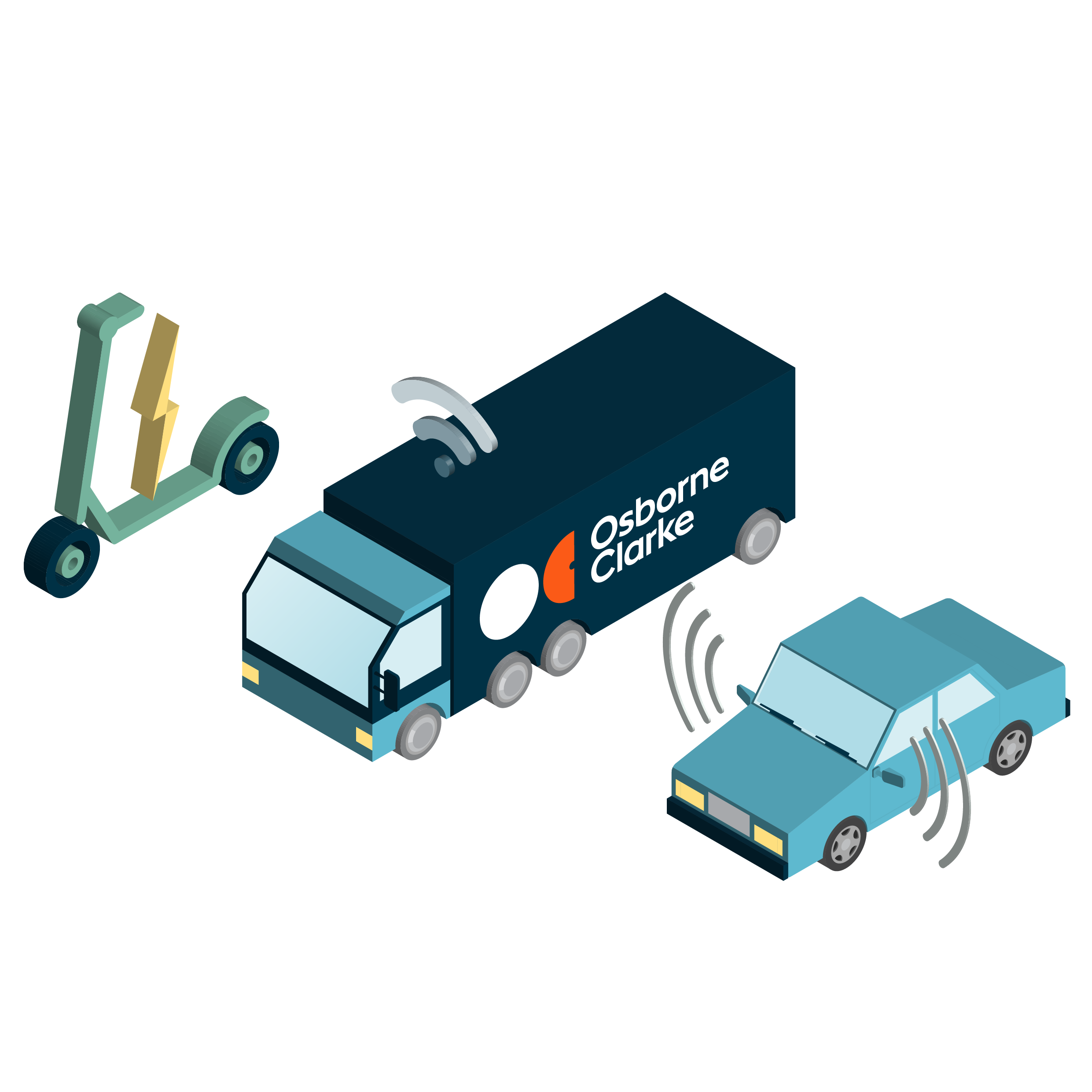Why close attention to consumer law is crucial for mobility-as-a-service success
Published on 26th May 2022
Complex international MaaS transport solutions require a focus on compliance as the EU beefs up its protection of digital consumers

What are the consumer law considerations in MaaS? Listen to the episode below and subscribe for more. |
The benefits that mobility as a service (MaaS) solutions for urban transport bring to consumers are clear: they provide users with convenient, simplified, tailored and seamless travel. While MaaS operators will look to capitalise on these positives, there are challenges from a consumer law perspective. There are different consumer laws to consider when operating across borders as well as a range of transport-specific consumer-related legislation.
The questions that MaaS platform operators will need to consider first in relation to consumer law will be related to how their contracts are going to work. Who is going to be the party selling the transport solutions to the consumer? Will it be the MaaS platform itself or will they be operating more like a marketplace? Will they be the transport provider? These questions are important as a lot of consumer law in terms of compliance in relation to the contract and also the pre-contractual information will flow from their analysis and answers.
Complex ecosystems
The problem with MaaS is that its ecosystems can be complicated. There are a lot of stakeholders involved in the delivery of MaaS often with a complex web of contracts. Although much will depend on the structure of the MaaS ecosystem, generally, the consumer is going to have one contract directly with the MaaS platform that will cover the use of the platform and the purchase of a journey ticket that covers multiple modes of transport.
However, from the perspective of the consumers' use of the transport services, there will also usually be a separate contract between the consumer and the transport service providers. If something goes wrong with the transport service itself – perhaps the service is delayed and the user is late for the next connection in their MaaS journey – then the platform operator is likely to want to carve out the liability and direct the customer to the travel provider in the contract.
There are a number of considerations in light of this complex MaaS structure. If the contracting parties have multiple contracts – for example, one with the MaaS platform and one with the transport provider – then each of these need to be considered separately. However, the first thing that needs to be considered is the nature of the contracting party, as there are exemptions under consumer law for passenger transport services. As these exemptions are not defined at an EU level, it will depend on how it is defined (or whether it is not defined) by the Member State and will require taking advice in each jurisdiction relevant to the MaaS platform.
Generally, this approach will catch the actual providers of the transport – for example, a train or bus operator – rather than those who are more removed, such as the platform. The exemptions to consumer law will apply to the contract when the contracting party is the actual transport provider, but not apply when the contracting party is the platform. The contracts will be governed by the full body of consumer law. The reason why this exemption exists is because there is a specific regulation that falls on parties such as train operators that cover these points.
Pre-contractual information
The pre-contractual information also needs to be considered. There may be two sets of pre-contractual information, given the complexity of the structure from the perspective of a MaaS platform. There is the pre-contractual information obligations that flow from the MaaS platforms' relationship with the consumer.
Also, because consumers book through platforms, it is likely that the transport provider will also want to pass on any pre-contractual information requirements that fall on them to the MaaS platform – they don't have the ability to fulfil this, as they don't own the interface with the consumer. These contractual arrangements were part of the focus of the European Commission-funded research project, My Corridor, which explored cross-border MaaS provision and the technical, commercial and legal challenges and opportunities – including from a contractual perspective – through the creation of an app that was tested across Europe. Osborne Clarke worked with 16 partners from the United Kingdom and the European Union, including Dutch navigation technology developer Tom Tom, Austrian mobility tech developer Swarco and Newcastle University.
One of the service providers that the project consortium looked to contract with was a ride-hailing service provider, which sought to impose specific contractual obligations on the My Corridor app operators to provide pre-contractual information. The MaaS app needed to provide consumers with this information, particularly about pricing and extra charges; for example, a ride-hailing provider may apply additional charges for waiting time and multiple stops or if the consumer causes any physical or property damage. The obligations were to provide consumers with specific advance information and ensure that consent was obtained from trial participants – in this instance, for extra payments above the originally marked price.
The interface was between the app and the consumer. If the MaaS app didn't comply with the specified requirements, then My Corridor would have had to reimburse the ride-hailing service provider for any losses it suffered as a result of having to reimburse a consumer. If additional payments are not brought to the attention of the consumer and they don't give their express consent to them upfront, then they are entitled to a refund of those payments. Since the MaaS platform was the party able to give that pre-contractual information, the transport provider wanted this to flow through under the contracts.
Interested in hearing more about MaaS?Register to receive our latest updates about the various legal issues, challenges and opportunities in MaaS. Register here > |
New Deal, new rules
The EU's "New Deal for Consumers" initiative – which comes into place from 28 May 2022 – is also set to bring further compliance requirements for the MaaS industry. The EU intends through this new, flagship consumer agenda to learn lessons from the implementation of the General Data Protection Regulation (GDPR). The European Commission wants to drive compliance with consumer law through increased sanctions and what it has termed as "GDPR style" fines that are linked to percentage of turnover. The New Deal initiative is also an attempt to update consumer law, which was largely drafted in the 1990s in response to a market that was very different from today's. With the growth of the internet and online sales to consumers, including MaaS platforms, the EU's intention is to update the obligations in order to deal with these new and often complex business models.
There will be new obligations that are relevant to MaaS platforms. Although these will be fact specific and depend on the contractual structure and functionality of individual platforms, there are new obligations on online marketplaces.
Existing mechanisms
Although the EU's New Deal will bring additional powers, most jurisdictions have already had some type of mechanism for fining for non-compliance. ln the UK, for certain breaches, there is an unlimited fine and it is a criminal offence with up to two years in prison for officers of the company. More broadly, the consequence of non-compliance is often that the contract with the consumer fails and the consumer has a right to a refund or the right to rescind, terminate or withdraw from a contract. The result of all this tends to be one thing: the trader has to refund the consumer and, if there are a large number of these, this can be expensive. Moreover, in some situations, there is, in principle, the ability for damages.
What the is EU is seeking to do with the New Deal is to make sure that the fines are not capped at levels that are too low. Historically and currently the capped fines have been at low levels, such as €5000, in some Member States. The lowest cap under the New Deal that any Member State can have will be 4% of turnover, so that the protection on fines will be taken away in many jurisdictions.
Moreover, the EU is bringing in the right for consumers to come together as a group and to seek financial compensation. This will apply across the EU, which raises the potential for large classes of consumers bringing actions for compensation that could be financially very significant.
Osborne Clarke comment
There are a range of practical measures that MaaS platform operators can consider to help to ensure compliance. The first step would be to understand their contracts. They should look at the New Deal and consider the issues around reviews, rankings and the online marketplace – and, maybe, take legal advice, particularly around online marketplaces as the legal and regulatory issues are quite complex.
A look back at historic compliance is also helpful. Businesses might have taken a risk-based approach to some compliance issues in this area, historically and potentially on the basis that fines have been relatively modest. The arrival of the New Deal for Consumers means that the risk profile is going to be quite different and will need to be reassessed in light of the increased sanctions.
A MaaS ecosystem is often complex, which means that considerable thought and time needs to be dedicated to ensure consumer law compliance – and this needs to be addressed well before the launch of a platform. Some of these consumer law requirements may seem burdensome, but user trust is central to the success of a MaaS platform. Those that are able to demonstrate compliance with these transparency requirements of consumer law may help a MaaS platform gain further user trust and confidence – and grow its market share.
This is the second in a series of articles drawing on Osborne Clarke's recent set of podcasts that explored the legal and wider issues surrounding the development of MaaS. The next article will look in more depth at competition law and MaaS.









